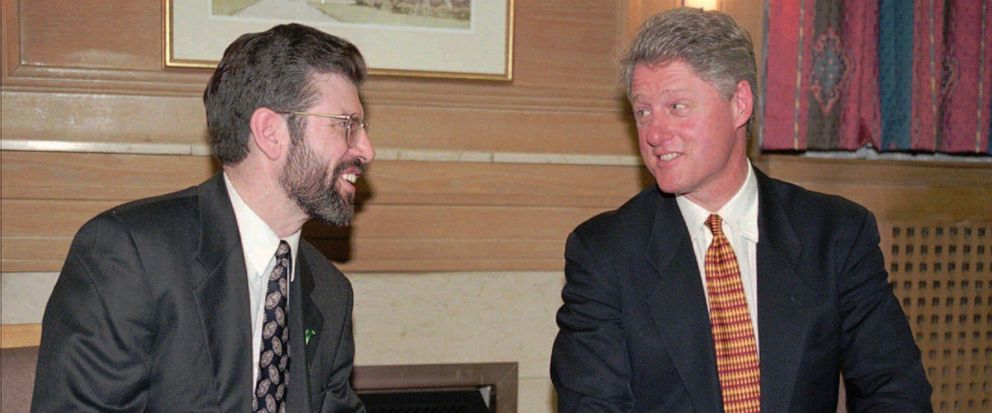Global Courant 2023-04-17 11:53:12
BELFAST, Northern Ireland — Former US President Bill Clinton and former leaders of the UK and Ireland will meet in Belfast on Monday, 25 years after their charm, influence and determination helped Northern Ireland strike a historic peace deal.
They gather for a jubilee conference in a Northern Ireland that has changed dramatically since 1998, and where some question whether the agreement that led to peace can still sustain it.
A young, peacetime generation is increasingly shedding the rival identities – the British Unionist and the Irish Nationalist – which erupted into three decades of carnage that left 3,600 dead. But at the same time, Northern Ireland is embroiled in a political crisis that threatens to disrupt the peace guaranteed by the Good Friday Agreement.
“You have a transformed society where (the labels) unionist, nationalist mean nothing to a lot of young people,” said Katy Hayward, a professor of political sociology at Queen’s University, Belfast.
“But on the other hand, society is quite in decline. We haven’t had a functioning Assembly for four of the past six years and our public services are crumbling.’
Clinton, who recently called the day the peace deal was signed “one of the happiest days of my presidency, in fact, of my entire life,” joins former British Prime Minister Tony Blair, ex-Irish Prime Minister Bertie Ahern and North -Irish politicians and peacemakers for a conference at Queen’s University, where former US Secretary of State Hillary Clinton is chancellor.
Former US Senator George Mitchell, who is 89 and battling leukemia, has also made the trip to Belfast, where he chaired the negotiations for two difficult years to reach the deal.
The three-day gathering concludes commemorations, including a flying visit last week from President Joe Biden on his way to discover his Irish roots in the neighboring Republic of Ireland. Speaking in Belfast and Dublin, Biden reminded Northern Irish politicians how strongly the US continues to invest in peace.
“I wanted to make it clear that there is a lot at stake, a lot at stake,” Biden told reporters on Friday as he left Ireland. “And I think the combination of Ireland, the whole island, Britain, Northern Ireland, the United States can change the way things happen.”
The Good Friday Agreement is being held up around the world as proof that bitter enemies can make peace. It required armed groups to stop fighting and set up a Northern Ireland legislature and government with power shared between unionist and nationalist parties.
British Prime Minister Rishi Sunak, who will host a gala memorial dinner in Belfast on Wednesday, praised “the courage, imagination and perseverance” of the peacemakers, including those such as former Northern Ireland secretary Mo Mowlam, who has since passed away.
But critics say the British government has been careless at best with peace in Northern Ireland, especially in leading Britain out of the European Union after a referendum in 2016.
Brexit shook the peace settlement by creating friction between Britain, the EU – including member state Ireland – and the US. It also destabilized the delicate political balance in Northern Ireland, due to the need for a customs border between the EU and now ex-member the UK. An open border between Northern Ireland and EU member Ireland is one of the foundations of peace, so controls were introduced on goods transported from mainland Great Britain to Northern Ireland.
That has unsettled unionists, who see the economic barrier as undermining Northern Ireland’s place in the UK. The Democratic Unionist Party left the government in protest more than a year ago and caused it to collapse. The party has not returned, despite a deal reached in February by the UK and the EU to lift many of the border controls.
As they reflect on the past, conference attendees will grapple with how to get the power-sharing government back to work.
Pleas from the UK, the EU and the United States have so far failed to bring the DUP back into government. Local elections in Northern Ireland next month will give an indication of whether the party’s intransigence has cost its votes.
More and more people argue that power-sharing needs to be adjusted to reflect the growing importance of forces such as the Alliance Party, which describes itself as neither unionist nor nationalist.
Meanwhile, the violence has not completely disappeared. In February, IRA dissidents opposed to the peace process shot and wounded a senior police officer.
Former Irish leader Ahern, who played a key role in the 1998 peace talks, urged the DUP to compromise.
“If you don’t do that, you don’t make much progress in politics,” Ahern told Sky News on Sunday. “We have to get away from, you know, ‘This is the position and no other position is satisfactory.’ It is not sustainable or sustainable and it is not in the interests of the people of Northern Ireland.”








